America's suburbs are becoming more diverse — economically and racially — but they are still just as dependent and just as unsustainable because of car culture.
A new study just published in the journal Urban Planning reveals that even as the demographics shift, suburbs remain defined by their dependence on driving and low-density development — which then gives suburbanites a distinct political identity.
"Whether supportive of automobility or not, they are locked in an environment and lifestyle that make dependence of the car a necessity," said study author, Pierre Filion of the University of Waterloo. "Much of the world view of suburban residents is fashioned by what they see through the windshields of their cars."
Challenges to that dynamic — such as the experience of metro Toronto — have met with backlash, writes Filion. About 175 million Americans live in suburbs. Those areas are key "swing districts" (and, at least in the 2018 midterms, swung Democratic).
Some scholars have predicted a "post-suburban" political landscape as cities become whiter and suburbs more diverse. But Filion says that notion premature.
Toronto has been more progressive than most North American cities about trying to promote density in the suburbs and reduce dependence on driving. But those efforts have had limited success, and in some cases have backfired.
For example, in 2006, Ontario established 25 "urban growth centers" in suburban areas of Toronto. When Filion examined the four most-advanced of those areas, he found that only one was very successful at offering an alternative to car-based suburbia. The other three — former mall sites — were all redeveloped at mostly suburban densities. The land area in each development was between 25 and 40 percent parking. The single site that was successful at becoming more dense — previously low-rise retail — was served by strong transit, including a subway line.
The study showed that increasing use of automobiles resulted in "the normalization of aspects related to unsustainable living," Paul Ratner wrote in the Big Think. "This lifestyle also makes people more resistant to calls for 'transformative' changes that would influence their 'comfort and convenience,' said Fillion."
Suburban resistance to urbanization can take two forms, Filion said: the classic NIMBY (Not in My Backyard) activism against policies that densify the suburbs or challenge the dominance of cars, is one form. NIMBY organizing to oppose zoning changes that would increase urban density have been a major thorn in the side of sustainable development advocates in U.S. cities.
Toronto has seen even more extreme types of suburban political mobilization. The election of former Toronto Mayor Rob Ford, a Trumpian figure who ran on a theme of "suburban alienation" and threats to automobility, is an example of the kind of wider populist backlash that can result from perceived threats to the suburban way of life, Filion said.
Ford made frequent reference to a "War on Cars" during his campaign and promised to cancel transit expansion plans. He also frequently suggested that downtown "elites" were unfairly gobbling up resources.
Those kinds of populist appeals were mobilizing for suburban voters, even as Toronto's suburbs become increasingly racially diverse. Support in Toronto's outer-suburban areas helped carry Ford to victory, to a much greater degree than his predecessor.
After Ford's death, his brother Doug was elected Premier of Ontario on a promise to lower the gas tax by 10 cents.
"While the socioeconomic makeup and economic base of the North American suburb are in transition, one of its determining features, accounting for the enduring specificity of this urban environment, remains profoundly embedded," Filion concluded.






